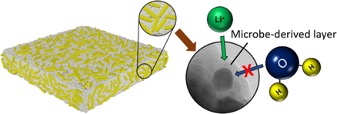Scientific Achievement

A team of Foundry users developed a new nanocomposite generated by microbes for creating anodes used in water-in-salt (WIS) Li-ion batteries (LIBs).
Significance and Impact
This is the first report of a biomaterial being deployed in a WIS-based LIB anode. It is a critical step towards developing safer LIBs and opens the door to more sustainable, microbe-derived materials for applications in energy storage.
Research Details
- The research team synthesized microbe-derived composites on TiO2 and evaluated the effect on the performance of WIS-based LIBs.
- Microbe-derived anodes had 49% higher capacity and enhanced cycle life compared to anodes made with conventional material.
- Using density functional theory, the increased performance was attributed to the microbe-derived material containing a high % of pyridinic nitrogen which has a higher binding affinity to water than carbon layers.

